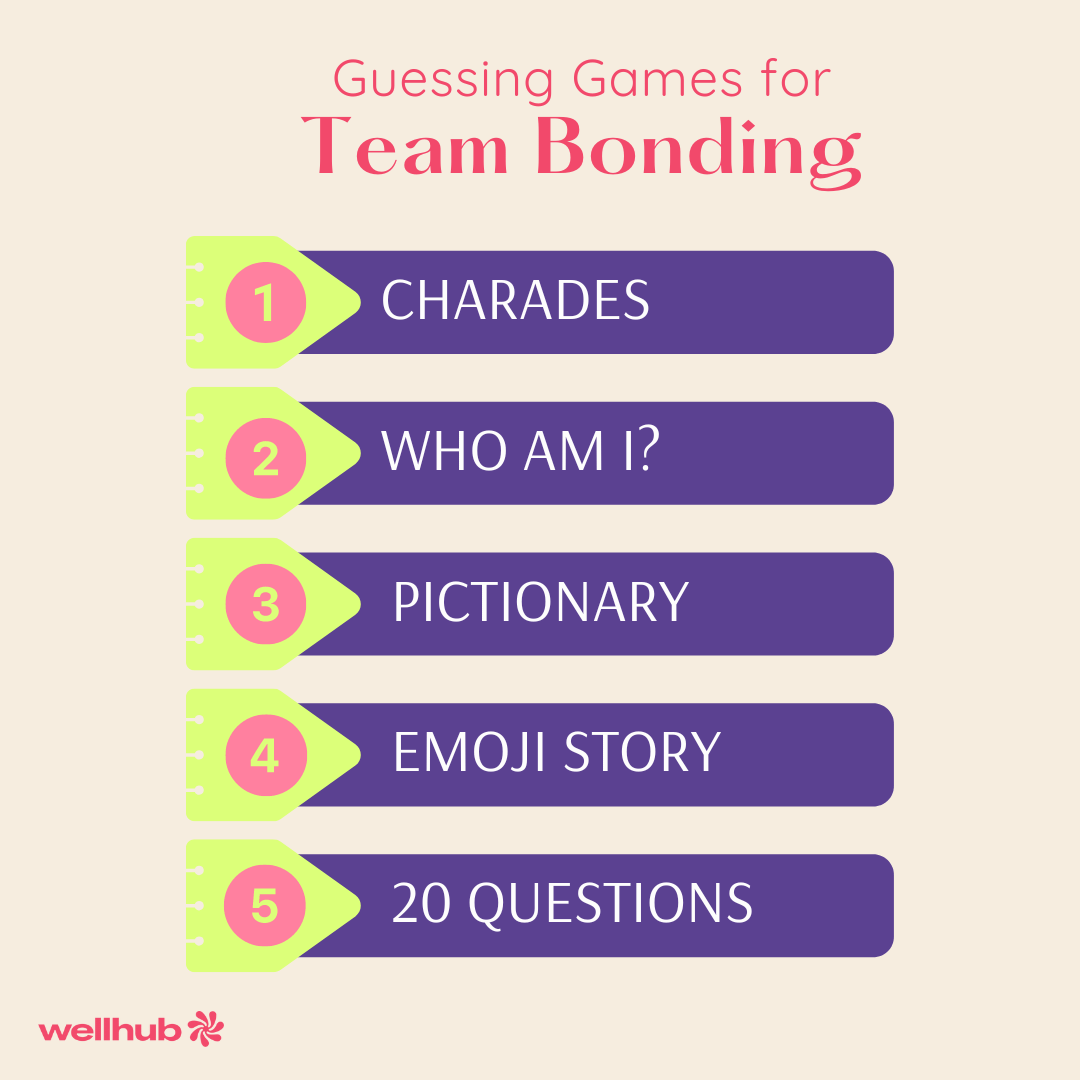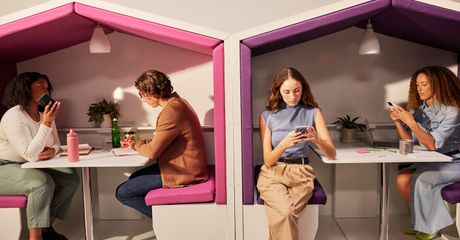6 Guessing Games to Spark Team Building
Last Updated May 9, 2025

Guessing games can be a great way to foster communication and collaboration in the workplace. They help create an environment where team members can trust each other, work together, and have more fun while doing it.
With these games, you can encourage problem-solving skills, cooperation between colleagues, and build camaraderie in the office. This can help your team build stronger relationships with each other that they can take outside the office and into their everyday lives.
Fusing creativity, laughter, and quick thinking, these games can help you create stronger, more collaborative teams in your workplace!
- Charades
In this office version of Charades, players are divided into two teams. Each team picks from slips of paper with clues related to common office scenarios. These could be job role-specific tasks, industry news, or fun facts about colleagues.
How to Play:
- One person from the team must act out the given scenario without speaking.
- The rest of the team attempts to guess what's being acted out.
- Each team gets two minutes to guess as many clues as they can.
- Once the time's up, it's the next team's turn.
- The team that guesses the most clues correctly wins the game!
The beauty of this game lies in its ability to spark creativity and foster teamwork. The acting team member needs to think on their feet and communicate the clue creatively through gestures. The rest of the team must work together, brainstorm, and connect the dots to decode the actions. As a result, it paves the way for colleagues to understand different perspectives, as everyone has a unique style of interpreting and communicating scenarios.
- Who Am I…at Work?

"Who Am I?" is a timeless guessing game that can be easily adapted for a fun, engaging corporate experience. To kick-start the game, write the name of various job roles within your company on sticky notes. These roles can range from specific jobs such as 'HR Manager' or 'Digital Marketing Specialist' to broader categories like 'Engineer' or 'Sales Team Member'.
How to Play:
- Without seeing what is written on the note, each player sticks it on their forehead.
- Each participant takes turns asking yes-or-no questions to the group to try and guess the assigned role now plastered to their forehead.
- Questions can be about the nature of the work, the department it falls under, or any other work-related aspect that helps identify the role.
- A player can continue asking questions until they figure out the role affixed to their forehead.
- The game continues until everyone has correctly guessed their role.
This team building exercise encourages employees to think about the varied responsibilities and tasks that their colleagues handle daily. By exploring questions and discussing different roles, team members gain a deeper understanding and appreciation of each other's contributions. The game also reinforces the idea that every role, no matter how big or small, plays a crucial part in the company's overall success.
- Pictionary: Office Edition
To turn this game into an “Office Edition,” replace the traditional Pictionary prompts with concepts related to your workplace. They can be industry-specific terms, jargon, project codenames, or even team inside jokes.
How to Play:
- Divide your team into small groups
- Prepare a deck of cards with your workplace-themed prompts.
- Each round, a representative from a team picks a card and tries to draw the concept on a whiteboard.
- Their team has a set time limit (say, two minutes) to guess the concept based solely on the sketch.
- If the team guesses correctly and within the time limit, they earn a point. If not, the other teams get a chance to steal the point by guessing correctly.
- Rotate the artist role within teams for each round.
- The team with the most points at the end wins the game.
As players try to articulate complex concepts through drawings, they learn to communicate more effectively with minimal resources. In a work environment where we often rely on written or verbal communication, this game provides a refreshing and fun way to understand and express ideas visually. Coming up with creative ways to represent different prompts encourages out-of-the-box thinking, a skill highly beneficial in problem-solving and innovation at work.
- Guess the Work Emoji Story
This game involves creating short 'stories' or 'scenarios' using only emojis and letting the team guess what they represent. This could be a summary of a recent project, a day in the life of a team member, or even a company event - all represented in emojis!
How to Play:
- Divide your team into groups and provide each with a digital platform to create and share their emoji stories. You can use chat platforms like Slack, Microsoft Teams, or even a shared Google Doc.
- Each group has to come up with a story or a scenario using only emojis.
- Once a group shares their emoji story, the other groups have to guess what it represents.
- Points are awarded for correct guesses, and the team with the most points at the end wins.
This game can help to break down barriers in remote teams, as emojis offer an international language that transcends geographical and linguistic boundaries. In essence, this game can help to enhance communication, build mutual understanding, and inject a bit of whimsy into your team's digital interactions.
- 20 Questions: Career Path Edition
This game is designed to provide insights into your employees' professional backgrounds, achievements, and experiences.
How to Play:
- Start by choosing one team member to think of a moment, event, or decision in their career. It could be their first job, a significant project, or a pivotal career decision.
- The rest of the team then takes turns asking yes-or-no questions to try and identify the career moment.
- The game continues until the moment is correctly guessed or until 20 questions have been asked, whichever comes first.
- Rotate the role to another team member and repeat the process.
This game encourages open dialogue about career development, providing a platform to share personal stories, triumphs, and even challenges. This process can help foster respect for the diverse career paths within your team, helping to create a more empathetic and supportive work environment.
- Bingo: Get to Know Your Team Edition
In this version of Bingo, instead of numbers, the squares on the bingo card represent interesting facts, hobbies, or little-known talents related to team members.
How to Play:
- Prior to the game, distribute a survey to your team members to gather unique facts about them.
- Using this information, create customized bingo cards and distribute them to each player. Each square should contain a unique tidbit about your staff.
- To play, team members go around asking each other questions to match their colleagues with the facts on their bingo card. When a match is found, the corresponding square is marked off.
- The first player to complete a horizontal, vertical, or diagonal line of marked squares shouts "Bingo!" and wins the game.
This game promotes open dialogue and allows individuals to share aspects about themselves that may not typically surface in a work context. It helps them get to know and appreciate the diverse backgrounds, talents, and interests within their team. Moreover, it encourages communication, listening skills, and creates a more inclusive work environment where everyone's unique story is valued.
How to Host an Effective Team Building Session (Step-by-Step)
Games are a great way to encourage employees to build relationships, but true team building takes more than an activity. The way you facilitate the event shapes how effective it is. Here are nine steps you can take to get the most out of your guessing game activities.
- Define Your Objectives
Start with a clear understanding of what you hope to achieve with theteam-building session. Whether it's improving communication, boosting morale, or solving specific team issues, your objectives will guide the planning process and help you choose activities that align with your goals.
- Know Your Team
Consider the dynamics of your team—the mix of personalities, interests, and the current state of their relationships. Choose activities that cater to your team's unique characteristics and needs. A diverse team might benefit from games that celebrate their differences, while a new team might need exercises that focus on ice-breaking and initial bonding.
- Plan with Inclusivity in Mind
Ensure that the activities are accessible and enjoyable for everyone. Select activities that are mindful of the particular team's physical abilities, and be mindful of cultural sensitivities. The goal is to make every team member feel valued and included, not sidelined.
- Schedule Wisely
Consult with the team to pick a time that works for everyone, keeping in mind workloads and personal commitments. Assuming the event is taking place during work hours, ensure tasks are covered so that team members can participate without stress.
- Choose the Right Setting
Whether it’s in-office, offsite, or virtual, the environment plays a crucial role in the session's success. Offsite locations can provide a fresh perspective and break from routine, while virtual events need to be engaging enough to keep remote participants involved.
- Facilitate, Don't Dictate
Your role as a facilitator is to guide the session and encourage participation, not to control it. Provide clear instructions and then step back to let the team engage with the activity. Be ready to steer the conversation or activity back on track if needed, but allow the team to take ownership of their experience.
- Encourage Open Communication
Create a safe space for team members to express themselves without fear of judgment. Encourage sharing of ideas, thoughts, and feelings. Activities that require problem-solving or creativity are excellent for promoting open dialogue.
- Provide Feedback and Recognize Contributions
During the activity, look for opportunities to recognize the efforts and achievements of your team. Positive reinforcement can boost morale and encourage continuous engagement and improvement!
- Follow Up
Team building is not a one-off event but an ongoing process. You can follow up on the session’s outcomes, and integrate the lessons learned into daily work life. Consider planning regular check-ins or follow-up sessions to build on the progress made.
Friendship Fuels Workforce Wellness
Celebrating each other plays an instrumental role in shaping an individual's work experience, often influencing job satisfaction, stress levels, and even professional growth. The synergy between camaraderie and wellness is undeniable. When employees feel taken care of, it positively impacts their mental health, elevating their performance and motivation.
This can manifest in an increase in both physical and mental wellness. And you can help your staff members capitalize on this motivation to improve their wellbeing through an employee wellness program. It could include fitness classes, mindful meditation, or designated days off for team bonding!
By nurturing both physical and emotional wellness, you create a supportive, inclusive work environment that truly prioritizes your employees' wellbeing. If you would like to learn more about enhancing workforce wellness, reach out to a Wellbeing Specialist today!

Company healthcare costs drop by up to 35% with Wellhub*
See how we can help you reduce your healthcare spending.
[*] Based on proprietary research comparing healthcare costs of active Wellhub users to non-users.
References
- Creating joy in the workplace. (December 2021). Science Direct. Retrieved June 27, 2023 from https://www.sciencedirect.com/science/article/abs/pii/S0720048X21005003.
Category
Share

The Wellhub Editorial Team empowers HR leaders to support worker wellbeing. Our original research, trend analyses, and helpful how-tos provide the tools they need to improve workforce wellness in today's fast-shifting professional landscape.
Subscribe
Our weekly newsletter is your source of education and inspiration to help you create a corporate wellness program that actually matters.
By subscribing you agree Wellhub may use the information to contact you regarding relevant products and services. Questions? See our Privacy Policy.
Subscribe
Our weekly newsletter is your source of education and inspiration to help you create a corporate wellness program that actually matters.
By subscribing you agree Wellhub may use the information to contact you regarding relevant products and services. Questions? See our Privacy Policy.
You May Also Like

12 Team Building Activities Your Team Will Love | Wellhub
12 fun and effective team building activities that build trust, engagement, and culture for every type of workplace.

5-Minute Team Building Activities [25 Ideas] | Wellhub
Team building activities can be a great way to boost employee wellness and keep employees engaged.

Creative Escape Room Ideas Facilitate Team Bonding | Wellhub
Escape rooms are fun ways to bond teams together. Here are creative escape rooms ideas that help your team bond and build problem-solving skills.